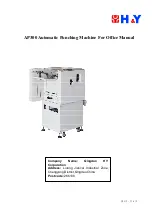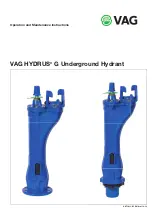
Ohio Medical, 1111 Lakeside Drive, Gurnee, Il 60031 (866) 549-6446 | Fax: (847) 855-6218
—– 550542 (Rev.6) 06/2016
P a g e
| 5
4. Release the pinched tubing and proceed with the suction procedure.
CAUTION: When operating unit in battery mode, the user must monitor the LED’s
to ensure enough battery power is left to finish procedure.
C) Recharging Battery
1. To recharge the battery, plug the AC power cord into its respective electrical outlet.
Verify the
Amber LED
is on.
Charging times varies depending on the condition
of the battery.
2. It is recommended to discharge the battery down to almost no charge 2 times a year
to optimize your battery performance and life.
D) Processing and Cleaning Instructions
1. WARNING: Please discard all contaminated parts after any suctioning procedure ac-
cording to law, region / national, or your hospital policy requirements for the
disposition of hazardous waste materials. These components may include the
connection canister, in-line hydrophobic filter, and all suction tubing.
2. Wipe the surface of the unit clean with a mild antiseptic and a clean soft cloth. Do not
allow any cleaning solution to spill into the vents on the unit.
3. Turn unit on to check the condition of the battery. If the “LOW” Red LED illuminates,
recharge the battery. Verify the unit can regulate to “FULL VAC” as outlined in sec-
tion II.A.3
4. Place a new collection canister, suction tubing and filter with the care-e-vac
®
3
.
III. Maintenance
WARNING: Never disassemble the care-e-vac
®
3
when the power cord is connected to an
electrical outlet.
To access the internal components of the care-e-vac
®
3
, place the unit right side up and
remove the six (6) (Philips) screws located on the back side of the unit. Slide the two front
and back covers away from each other.
A) Pump Cleaning
The heart of the care-e-vac
®
3
is a diaphragm pump. Over time, foreign particles may ac-
cumulate on the internal parts from aerosolized aspirant. It is recommended that the
pump head be disassembled and cleaned when a decrease performance is noticed. Pre-
ventative maintenance is recommended every six months depending on frequency of
use.
WARNING: Remove device from A/C power source prior to cleaning.


































